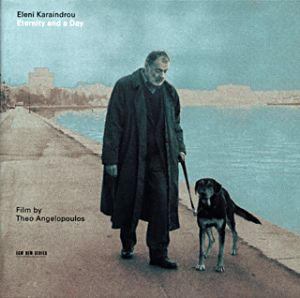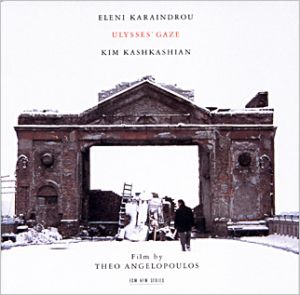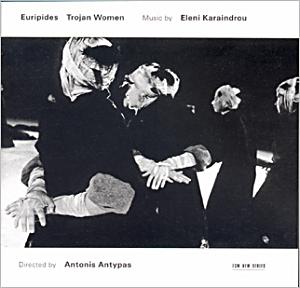Eleni KARAINDROU
Ulysses' Gaze & Eternity and a Day & Trojan Women
3 albums produced by Manfred Eicher and featuring various soloists
Ulysses' Gaze ECM New Series 1570 [59:43]
Eternity and a Day ECM New Series 1692 [46:37]
Trojan Women ECM New Series 1810 [50:02]



Eleni Karaindrou is probably the most successful Greek film composer to have remained working entirely within European cinema rather than go to Hollywood, as did Vangelis, and before him, though to a lesser extent, Mikis Theodorakis. Karaindrou has written the music for 18 films, and also composed extensively for television, radio and ballet, as well as providing the music for 40 theatrical productions. All of which are mediums which demonstrate her affinity for drama.
Even so, apart from the as yet unreleased score for this year's War Photographer, the two soundtracks reviewed here together with the score for a 2001 theatrical production of Trojan Women, represent her most recent film work.
Ulysses' Gaze is a 1995 film starring Harvey Keitel as a Greek filmmaker exiled to the United States who returns home to look for his family. This long, leisurely and introspective film was the fifth collaboration between Karaindrou and director Theo Angelopoulos. Eternity and a Day (1998) would be their sixth and final film together to date. Their earlier projects were Voyage to Cythera (1984), The Beekeeper (1986), Landscape in the Mist (1988) and The Suspended Step of the Stork (1991), all of which have been acclaimed on the art-house circuit.
Ulysses' Gaze is scored for string orchestra, viola, oboe, accordion, trumpet, French horn, violoncello and voice - the wordless soprano of Georgina Voulvi. Though the "voice" of the score, sufficient for Kim Kashkashian to be credited directly below the title on the front cover, is the viola. The disc, as are all three, is on the ECM New Series label. The original ECM is renowned for its clean and minimal European jazz , while the New Series offers elegant classical and "New Music" releases. There is a distinctive house sound and style into which Karaindrou fits perfectly. The spare, austere beauty of her work is ideally matched by the hermetically perfect production of label founder Manfred Eicher.
The score, divided into 17 tracks almost all of which bear the title "Ulysses' Theme" plus a variation number, plays for almost an hour. And while a thing of considerable beauty it is exceptionally repetitive. There is little change of tempo, scant action in any conventional sense. Only a series of very similar elegantly meditative moods which seem to stand outside of time. Apart from the haunting "Ulysses' Theme" there is a secondary "Woman's Theme", something of a cousin to Nino Rota's waltz from The Godfather (1972). Central to this music-making is the exquisitely subtle viola solo work by Kashkashian, while the heart of the score is condensed into one 17 minute, five part sequence bearing the film's title. For most listeners this track alone will be sufficient, though it must be said that the whole does have a mesmerising effect. The musicianship is impeccable and the recorded sound pristine clean as an operating theatre. The beautiful packaging, and this applies to all three discs, is a model of modern, tastefully minimalist design.
Eternity and a Day is about an elderly writer, Bruno Ganz, who discovers he has only a short time to live and must decide what to do with his remaining time on earth. The album is both shorter and considerably more varied than its predecessor. Again the music is scored for string orchestra and soloists, this time oboe, bassoon, French horn, mandolin, accordion, piano and two clarinets. Over the course of 18 tracks Karaindrou weaves a series of melodies around a central "Eternity" theme, cues ranging from the eloquent piano solo (played by the composer) "By the Sea" to a traditional wedding dance, various ensemble pieces, a touching elegy for string orchestra and clarinet, "To a Dead Friend" to finally a wind trio against strings for the moving finale, "Depart". More varied and thus more accessible, it is perhaps the better choice for the newcomer to Karaindrou's music. Even so, arguably Ulysses' Gaze contains the more beautiful writing.
Clearly the work of the same composer but altogether different in conception, Trojan Woman was written for a stage production of Euripides' drama, dating from around 415 B.C. but still deeply resonant today in its story of women as the victims of war. Directed by Antonis Antypas, the composer's husband, this is a score which combines the intimacy and introspection of the film soundtracks with a larger scale choral canvas. There are 30 cues, 11 being choral or vocal (featuring soprano Veronika Iliopoulou), reworked by Manfred Eicher in the studio to create a unified work from what was apparently a rather fragmented stage score. A reflection of Karaindrou's "other" career as an ethnomusicologist, the music features a range of traditional and historic instruments such as the ney, suling, santouri, bendir and lyra (the smaller booklet explains what they all are - yes, there are two booklets, the larger one offering photos, further notes and song texts). The result is simply magnificent, a tapestry of sound at once stark and harrowing yet extraordinarily beautiful and richly timeless, as if it had arisen fully formed from some race memory of antiquity. A rewarding yet emotionally draining odyssey, Trojan Woman is one of the finest albums of the year.
Gary S. Dalkin
Ulysses' Gaze -

Eternity and a Day -
Trojan Women -

Return to Index